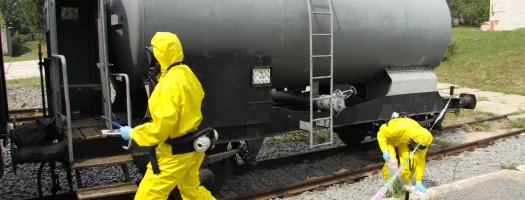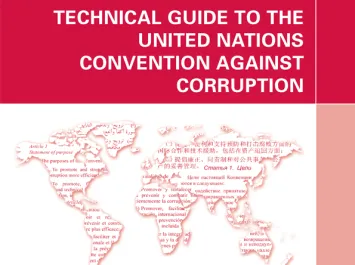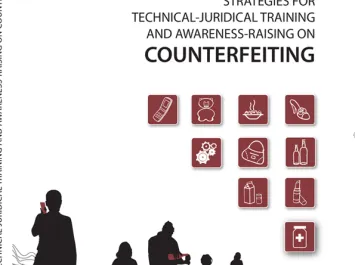With funding received from the European Commission’s Foreign Policy Instruments (FPI) within the framework of the European Union’s (EU) Chemical, Biological, Radiological and Nuclear (CBRN) Risk Mitigation Centres of Excellence (CoE) Initiative, UNICRI has recently published A Prosecutor’s Guide to Chemical and Biological Crimes. The Guide aims to provide police, prosecutors, and relevant investigative agencies with guidance to support the successful prosecution of incidents involving the deliberate acquisition, stockpiling, production, transfer, or use/misuse of a chemical or biological agent.
The Guide is a non-binding, high-level guidance document with considerations across key elements associated with the deliberate misuse of chemical and biological agents and toxins and the impact of these elements on the investigation, prosecutorial and adjudication processes. The publication is currently available in English, French and Ukrainian, and will soon also be published in Arabic, Spanish, and Russian.
A comprehensive capacity-building and training package was developed by UNICRI in order to integrate the provisions of the Guide into the professional duties of prosecutors. The primary component of the training package is centered on the five-day course entitled “Building a case for the prosecution of chemical and biological (CB) crimes”. This standalone, modulable course consists of 37 lessons that can be adapted based on the specific needs of the beneficiaries.
The training package allows the participants to learn about the entire process of investigating a case, starting from the crime scene contaminated with chemical and biological materials to the eventual prosecution and adjudication of the crime in the courtroom. While the training is intended primarily for prosecutors, it is also targeted at other judicial and investigative agencies due to the crosscutting nature of the prosecutorial work. This includes relevant law enforcement authorities which are leading the investigation and prosecution from the crime scene to the courtroom.
The beneficiary trainees will learn about international legal instruments and conventions; international assistance and support in case of investigations and prosecution; mutual legal assistance during the investigations and prosecution; crime scene investigation under CBRN conditions; national laws and counterparts; legislation, criminalization and classification; key partners in an investigation and national capabilities; planning the investigation and prosecution of CB crimes; investigative case review, case transfer and duration; investigative intelligence; undercover CBRN criminal operations; chain of custody, integrity and acceptability in court; adjudication and appeal processes; best practices and real case examples.
The long-term goal of this entire initiative is to integrate the training package into the curricula of national training institutions and academies for prosecutors and law enforcement agencies. Training institutions will therefore be involved in this initiative from the outset. This training course may be easily conducted at regional or national level in order to meet the requirements of the entities involved, and to promote exchange of good practices and expertise, dialogue and cooperation.
Photo credits: @ISEMI – www.isemi.sk.



